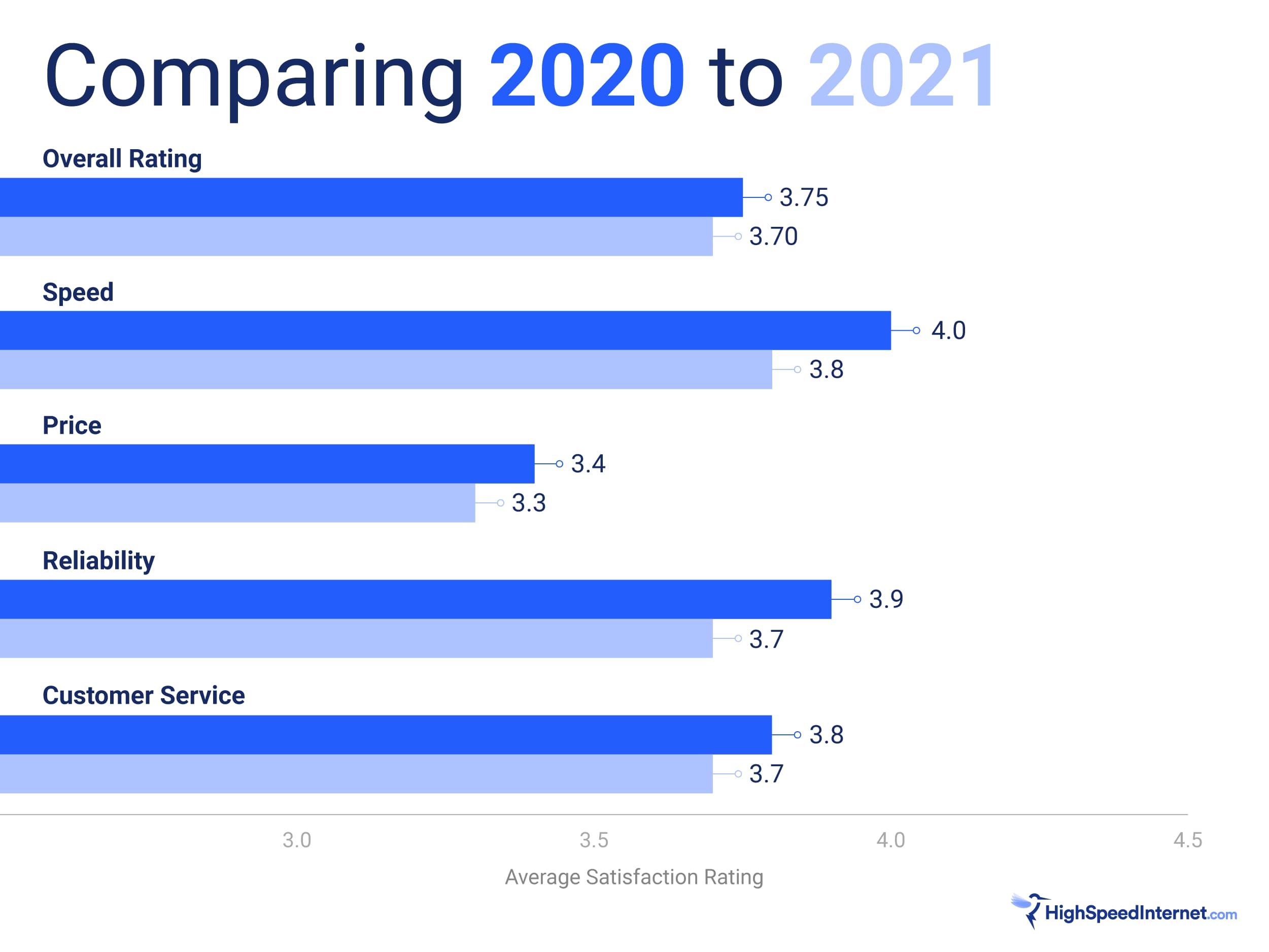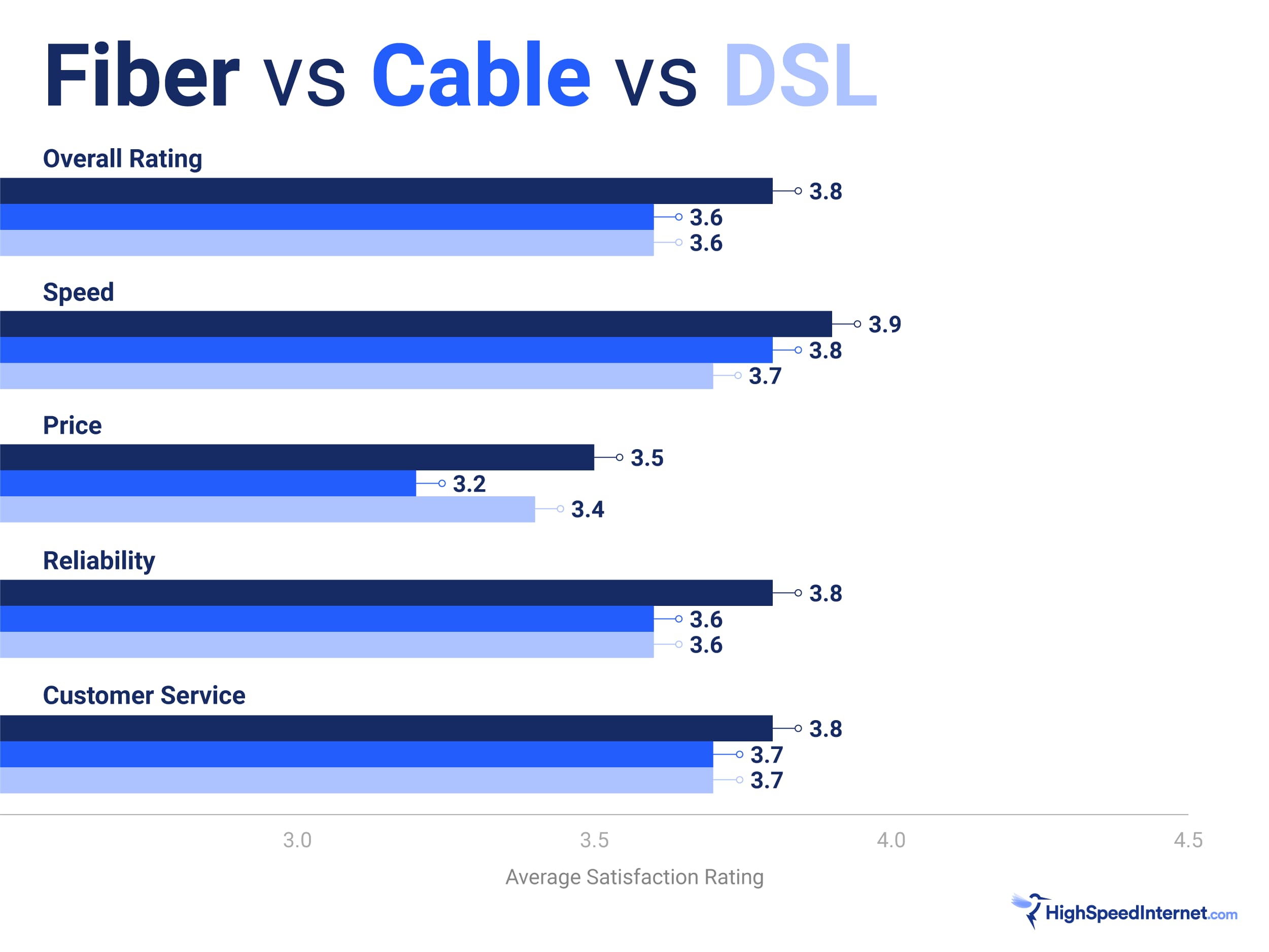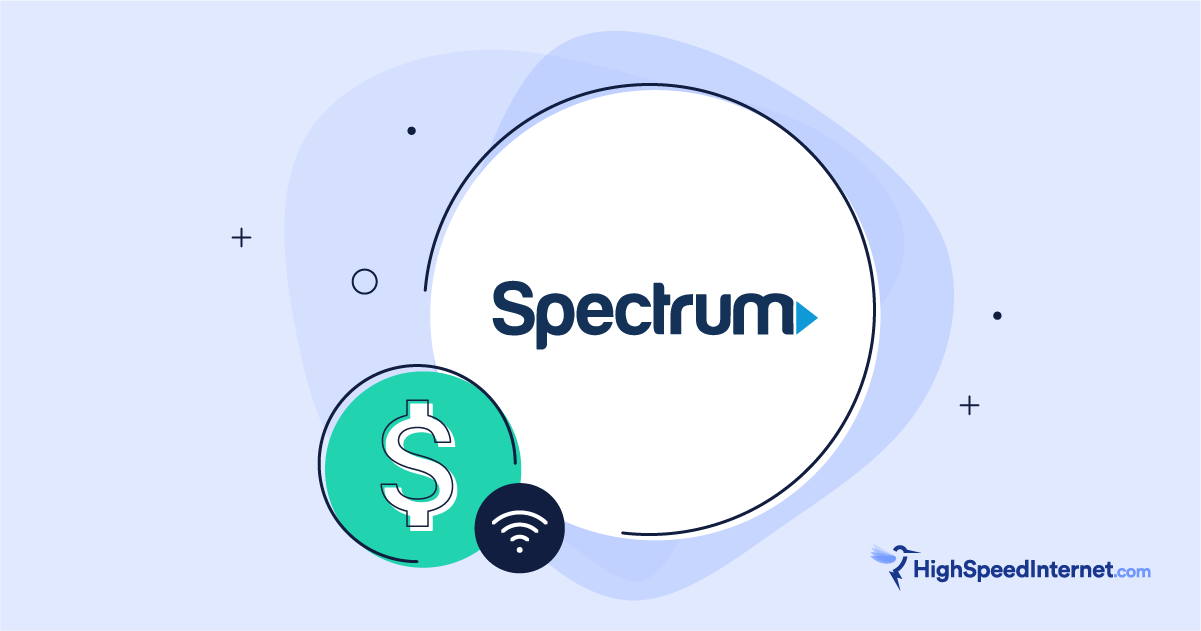2021 Internet Customer Satisfaction Report
We surveyed thousands of internet customers to see how internet providers stack up.
Jul 12, 2021 | Share
Brand Guides

We believe the best way to understand how well internet service providers (ISPs) perform is to ask the customers. So, every year, HighSpeedInternet.com surveys thousands of customers of the largest ISPs in the United States.
This year, we narrowed our survey to focus on four key areas that matter most to internet customers: speed, price, reliability, and customer service. We asked internet customers to give a satisfaction rating (on a five-point scale) in each of those categories and to report on what their ISP did specifically with things like slowdowns, outages, and unexpected price hikes.
Our 2021 survey results give a clear view of how internet providers stack up, as well as a broad view of internet market trends during a unique year of American life. Our 2020 customer satisfaction survey went out before the pandemic struck, so comparing the results from 2020 to 2021 allows us to see how the pandemic shaped Americans’ relationship to their home internet service.
One thing that hasn’t changed in the past year is that EarthLink’s customers are still the most satisfied—EarthLink swept all four key categories, with AT&T and Verizon following close behind.
Key findings and trends
- It’s been a stressful year for internet customers. The COVID-19 pandemic caused a sudden surge in home internet usage.1 Many Americans suddenly found themselves with inadequate internet connections as their needs changed, and we see this reflected in our survey results. Average satisfaction scores fell across the board compared to our prepandemic survey in early 2020. Ratings fell most significantly in the internet performance categories of speed and reliability.
- Fiber internet is king. Fiber customers are clearly the happiest. In every category, fiber customers gave significantly higher ratings than cable, DSL, and other types of internet users. Surprisingly, cable customers gave satisfaction ratings on par with DSL customers. This suggests that cable users had heightened internet needs and expectations in the past year and were frustrated that their service couldn’t keep up as well as fiber.
- Customers still love to bundle. A total of 58% of internet users report bundling their internet with TV service from the same provider. Those customers are far more satisfied than folks who don’t bundle.
EarthLink has the happiest customers, followed by AT&T and Verizon
For the second straight year, EarthLink takes the top spot in our survey for overall customer satisfaction, earning first place in all four major categories: price, speed, reliability, and customer service.
What’s interesting is that, while EarthLink sells internet plans and manages its own customer base, it doesn’t own and operate its own internet infrastructure. Instead, EarthLink sells internet bandwidth from other providers’ networks. Which means your EarthLink service could be totally different depending on where you live, and it should theoretically not perform any better or worse than the other providers that share the same network. In fact, despite the glowing marks for satisfaction, customers raise some alarms about EarthLink’s performance when it comes to slowdowns and outages.
So why does EarthLink get such consistently positive reviews? Besides offering straightforward pricing and unlimited data, EarthLink provides great customer service—which may endear customers enough to overlook their other complaints.
AT&T ranks second overall, with high scores across all categories. In a pandemic year when most ISPs saw their satisfaction rating drop, AT&T maintained the same strong overall rating of 3.8/5 that it received before the pandemic began. AT&T primarily provides fiber and DSL service, and not surprisingly the fiber customers are happier in every category, particularly speed and customer service.
After taking second place in our 2020 survey, Verizon has excellent results again in 2021. Verizon ranks second in speed, price, and reliability, and third in customer service. A total of 89% of Verizon customers say their internet speeds meet the needs of their household—more than any other provider. Verizon’s overall satisfaction score of 3.8/5 is a virtual dead heat with AT&T, just a couple decimal points behind on average.
How satisfied are you with your internet speed?
Customers gave ISPs higher ratings for speed than any other category, with an average rating of 3.8. But that rating fell from our 2020 survey, when the average speed rating was 4.0. The pandemic caused Americans to become far more reliant on their home internet for entertainment, video conferencing, and social connections.2 Those changing needs coupled with increased internet usage likely led to the overall drop in satisfaction in home internet speeds.
EarthLink ranks first for speed by delivering on the speeds that it advertises. A total of 44% of EarthLink customers say their speeds are “always” as fast as what their plan promises—that’s easily the most of any provider (Suddenlink was the next closest at 32%). Another 35% of EarthLink customers say their speeds are “usually” as fast as promised.
Overall, the vast majority of customers say their internet speeds work for them—when asked if their internet speeds meet the needs of their household, customers of every provider except CenturyLink say “yes” more than 80% of the time. (CenturyLink has a large footprint of DSL service, which explains its lower scores for speed.)
Satisfaction rating vs. tested performance
Does the highest rated ISP for speed have the fastest internet service? Not necessarily. Satisfaction ratings reflect internet customers’ perceptions and sentiments, but not of actual recorded performance. For a quantifiable view of the ISPs that perform best in actual speed testing, see our report on the fastest internet providers.
How satisfied are you with the price you pay for internet service?
Not surprisingly, customers gave their ISP the lowest ratings for price, with an average of 3.3. EarthLink came out on top in this category, despite the majority of EarthLink customers (52%) saying they’ve experienced unexpected price hikes or hidden fees on their bill—the second most of any ISP in the survey. Still, 62% of EarthLink customers are “very satisfied” or “100% satisfied” with their internet price.
Sparklight has the smallest percentage (31%) of customers who say they experience unexpected price hikes or hidden fees. AT&T is next best at 35%.
How satisfied are you with the reliability of your home internet service?
Customers are more frustrated with their internet’s reliability than they were a year ago—reliability ratings dropped significantly from our 2020 survey (from 3.9 to 3.7 on average). Similar to the speed category, the pandemic probably had a lot to do with that. Every ISP with the exception of Mediacom saw its reliability rating drop from 2020, with Optimum, Xfinity, and CenturyLink each dropping by a whopping half point.
Once again, EarthLink customers give the highest ratings for reliability, but those same customers also have troubling reports about outages and slowdowns. This suggests that EarthLink’s great overall customer experience has earned its customers’ loyalty in spite of any flaws. A total of 33% of EarthLink customers say they experience internet outages “way too often.” No other ISP is over 22% for that question, and the average is 13%.
Despite getting poor marks in satisfaction for reliability, Spectrum customers gave positive reports about outages, with 64% saying they have experienced outages “never” or “not often.” That’s better than any other ISP.
How satisfied are you with your provider’s overall customer service?
EarthLink takes first place yet again in customer service, which makes sense given the emphasis EarthLink places on customer relations and experience. A total of 40% of EarthLink customers say they are “100% satisfied” with EarthLink’s customer service—significantly beating the overall average of 24%. Interestingly, EarthLink has the highest percentage of customers (18%) who say they use their ISP’s app to interact with customer service, and EarthLink has the lowest number (36%) who use the phone.
Cox is another brand that has made a big effort to step up its customer service game, and its customers noticed. Cox received higher ratings for customer service than any other category, thanks to the 28% of customers who say they are “100% satisfied” with its customer service. Another 33% say they are “very satisfied.”
Satisfaction ratings fell this year as internet customers experienced pandemic frustrations
Satisfaction scores dropped from 2020 to 2021 in all four major categories (speed, price, reliability, and customer service), with the largest decreases coming in the speed and reliability ratings.
Though America’s internet infrastructure largely held up during the pandemic, many people suddenly found their internet plan wasn’t everything they wanted or needed it to be when life moved online. Rural and lower-income Americans in particular have had internet struggles during the pandemic.3 We see these frustrations clearly in our survey, as 11 of the 12 providers surveyed saw their speed and reliability ratings drop from 2020, with Mediacom being the lone exception.
The decreased satisfaction ratings in 2021 are more likely an indication of changing needs and expectations of internet users, rather than the internet connections themselves getting worse.
Fiber internet is where it’s at
While overall customer satisfaction ratings sagged, fiber internet still stands out above other internet types. Compared to cable and DSL internet users, fiber customers gave higher ratings in every category.
Brands that offer fiber internet as well as cable or DSL services consistently received better ratings from their fiber customers. For instance, RCN’s fiber customers gave a glowing 4.3 overall satisfaction rating, compared to 3.6 from its cable customers and 3.3 from DSL customers. Both CenturyLink and AT&T show the same trend with fiber and DSL customers, and Optimum scored much better with its fiber customers than its cable ones.
Fiber is the only type of internet that provides symmetrical upload and download speeds, while cable and DSL customers typically see upload speeds that are one-tenth of their download speeds. Because of this, fiber internet customers spent the pandemic largely oblivious to the buffering or Zoom call frustrations many other internet users experienced. Upload speed, which had previously been an afterthought for many internet users, suddenly became far more important as upload data usage soared—mainly due to the dramatic increase in videoconferencing.4
Likewise, fiber provides a more consistent and reliable connection than other internet types that are prone to congestion and slowdowns during peak hours. Fiber lines also tend to be newer and better maintained than older infrastructure, making fiber customers less likely to run into outages and slowdowns at inopportune times.
Get the latest on fiber
To read more about how fiber internet works and who the best providers are, see our guide to fiber internet providers.
Customers have mounting frustrations with cable internet
While fiber basks in the spotlight, cable seems to be the target of more frustration than it has been in the past. The nation’s two largest cable providers, Xfinity and Spectrum, saw significant drops in satisfaction ratings compared to 2020. Overall, cable internet doesn’t perform any better than DSL in 2021 satisfaction ratings across providers—even though cable is generally superior to DSL in speed and reliability.
Our data suggests, however, that the actual performance of cable internet providers is still strong. What has changed is cable customers’ needs and expectations. Cable customers gave the lowest ratings for price compared to other internet types, so they don’t feel like they are getting good value—especially when compared to fiber, which often provides better service at a comparable price.
Take Spectrum, for example. Despite a below-average speed rating of 3.7, 87% of Spectrum customers say their internet meets the needs of their household, while 60% say they are either “very satisfied” or “100% satisfied” with their speeds—and only 10% express dissatisfaction. Those numbers are all above average. Likewise, Spectrum ranks near the bottom of the reliability category with a rating of 3.6, but Spectrum does better than any other provider when customers are asked specifically about outages: 64% say they experience internet outages “never” or “not often.”
Xfinity follows the same trend: customers gave significantly lower satisfaction ratings in all categories, but 87% still say that Xfinity’s speeds meet the needs of the household. Customers seem to be saying that cable internet is adequate, but, for the prices they are paying, they wish they could get a better product—like fiber.
Fiber vs. cable
See our full article comparing fiber and cable for a complete view of how these two dominant internet types stack up.

Internet customers still love to bundle
Even with the rise of streaming TV services and cord-cutting, bundling internet with TV is still popular. The majority of those surveyed—58%—say they bundle their internet with TV service from the same provider. And customers who bundle gave an overall satisfaction rating of 3.7 on average, versus a much lower average rating of 3.4 for those who don’t. As you would expect, the largest difference is seen in price.
Some brands in particular have a dramatic split in ratings on bundling. Optimum bundle customers gave an overall rating of 3.6, versus 3.0 from those who don’t bundle. EarthLink’s bundlers have a 4.2 overall rating, versus 3.6 for those who don’t bundle. Suddenlink’s bundling customers are also happier, to the tune of 3.9 versus 3.2.
Three large brands are an exception, however, as Xfinity, Spectrum, and Verizon customers show negligible difference in overall satisfaction rating based on bundling. In fact, Xfinity and Spectrum bundle customers are slightly less satisfied with their price—the only ISPs to receive such a rating.

Standout data points about every ISP
- AT&T’s fiber customers are significantly more satisfied overall than its DSL customers: 3.8 vs. 3.6. Fiber customers gave a 3.9 speed satisfaction rating vs. 3.7 from DSL customers, and there is even a difference on customer service: 3.9 for fiber vs. 3.6 for DSL.
- CenturyLink got much better ratings from its fiber customers than its DSL customers. Fiber customers gave a 3.6 overall rating vs. 3.4 from DSL customers. Fiber customers gave significantly higher ratings in all categories, including a 3.7 vs. 3.4 in both speed and reliability.
- Only 1% of Cox customers say they are “very dissatisfied” with its customer service, while 61% say they are “very satisfied” (33%) or “100% satisfied” (28%) with the customer service—that’s better than any other provider.
- EarthLink is first in overall satisfaction by a huge margin—the difference between EarthLink (4.2) and the second-place finisher (AT&T at 3.8) is greater than the difference between second place and the last place finisher (CenturyLink at 3.5).

- Mediacom has made the biggest improvements from our 2020 survey to 2021. Its overall satisfaction score rose from 3.3 to 3.6, and Mediacom is the only ISP that improved its reliability score in 2021.
- Bundling looks like the way to go with Optimum. Customers who bundle report a 3.6 satisfaction score vs 3.1 for those who don’t. On price specifically, Optimum customers who bundle have a 3.4 satisfaction rating vs. 2.6 for those who don’t.
- RCN’s fiber customers’ overall satisfaction is a glowing 4.3, compared to 3.6 for its cable customers and 3.3 for its DSL customers.
- Sparklight customers report experiencing fewer unexpected price hikes and fees than any other provider—just 31% compared to an average of 41% across all providers.
- Spectrum customers report fewer problems with outages than any other provider: 64% of Spectrum customers say they experience outages “never” or “not often,” compared to an average of 54% across all providers.

- Suddenlink is one of the few providers to show improvement from 2020 to 2021. Suddenlink’s overall satisfaction rating rose from 3.6 to 3.7, and its specific ratings rose in price (3.2 to 3.4) and customer service (3.4 to 3.6).
- 89% of Verizon customers say their speeds “always” or “usually” meet the needs of their household—the best of any provider.
- 87% of Xfinity customers say their speeds “always” or “usually” meet the needs of their household.
Methodology
Our analysis is based on online surveys of internet customers in the United States. We surveyed internet customers of each ISP until we received 50 to 200 responses for each brand. Any ISP that didn’t meet that threshold was excluded in the survey results. In total, we received more than 2,000 survey responses.
It’s important to note that customer satisfaction ratings reflect customer sentiment but are not an exact representation of actual quantitative internet performance. As you can see below, we not only asked respondents for satisfaction ratings in each category (speed, price, reliability, and customer service), but we also asked contextual questions about their ISP’s performance in that area. Please also note that each ISP’s overall satisfaction rating is based on the average response to a separate question about overall satisfaction. It is not an average of its rating in the four categories because we did not want to assume that all customers weigh each of those categories equally.
After asking initial qualifying questions that told us each respondent’s ISP, type of internet service, and whether or not they bundle, these were the questions that we posed in the survey:
Sources
- Joseph Johnson, Statista, “Coronavirus: Impact on Online Usage in the U.S. – Statistics & Facts,” April 29, 2021. Accessed June 20, 2021.
- Ella Koeze and Nathan Popper, New York Times, “The Virus Changed the Way We Internet,” April 7, 2020. Accessed June 24, 2021.
- Doug Brake, Information Technology & Innovation Foundation, “Lessons from the Pandemic: Broadband Policy After COVID-19,” July 13, 2020. Accessed June 25, 2021.
- Ashley Murray, Pittsburgh Post-Gazette, “Internet Companies Handled ‘Dramatic Surge’ during Pandemic because of Infrastructure Investments, Industry Says,”August 9, 2020. Accessed June 9, 2020.
Author - Bison Messink
Bison Messink is the managing editor of HighSpeedInternet.com and is excited to help connect people to one of the vital resources of modern life: an internet connection. He's spent his career in digital media as a news reporter, blogger, and editor, and he was previously the executive editor at Thrillist. He has a master's degree in writing from the University of Wyoming, and he's experienced the fastest and slowest of internet connections while living in Laramie, Michigan, New York City, Buenos Aires, and Utah.
Editor - Rebecca Lee Armstrong
Rebecca Lee Armstrong has more than six years of experience writing about tech and the internet, with a specialty in hands-on testing. She started writing tech product and service reviews while finishing her BFA in creative writing at the University of Evansville and has found her niche writing about home networking, routers, and internet access at HighSpeedInternet.com. Her work has also been featured on Top Ten Reviews, MacSources, Windows Central, Android Central, Best Company, TechnoFAQ, and iMore.











